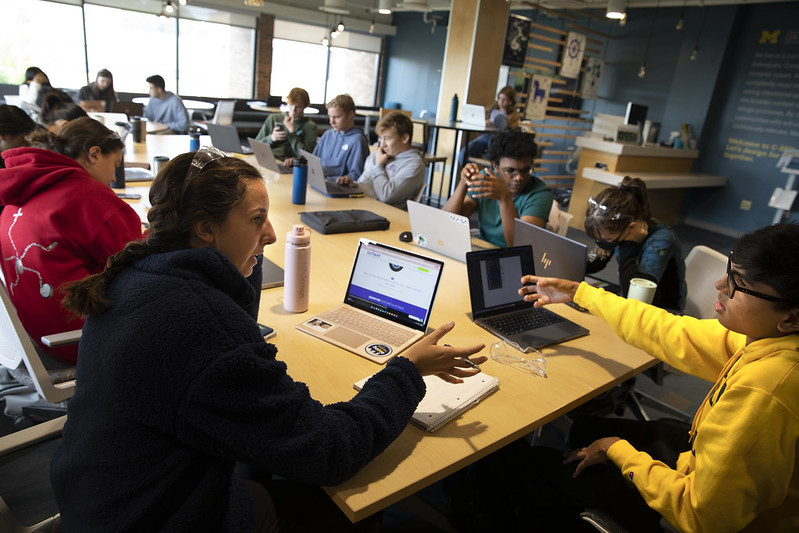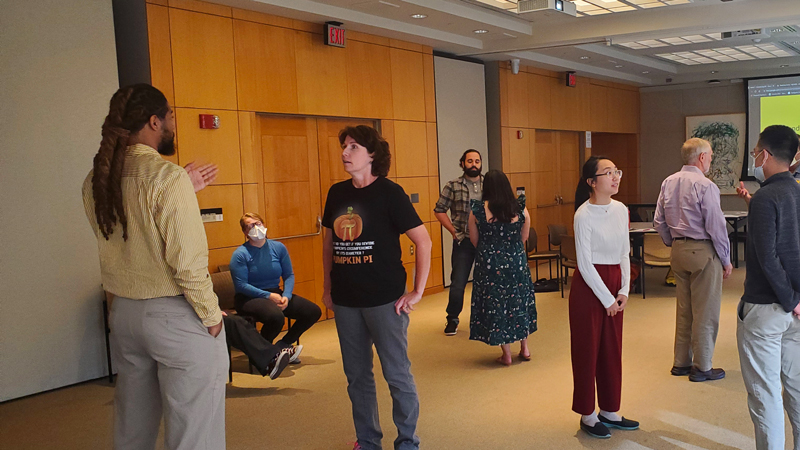A curriculum for equity-centered engineers
The social aspects of engineering are often missing from how we educate, leading to solutions that don’t benefit everyone equally. Our equity-centered engineering education initiative builds on our excellent engineering fundamentals—strengthening our curriculum to incorporate concepts of social justice, equity and ethics.
The Office of the Associate Dean for Undergraduate Education is bringing together efforts from across the College in partnership with the Center for Socially Engaged Design (C-SED) and the Center for Research on Learning and Teaching–Engineering (CRLT-Engin).
These efforts coalesced in October 2022 with the establishment of the Teaching Equity in Engineering Center (TEE Center).
Teaching Equity in Engineering Center
The TEE Center embeds diversity, equity and inclusion content directly into the engineering curriculum, equipping students and instructors with strategies for responsible, equitable engineering practice and improving the engineering climate.
“We’re formalizing what it means to teach new engineers to practice in an equity-centered way, so that they understand the gaps that exist in society and can create engineering solutions that deliberately close societal gaps rather than unintentionally expand them.”
Alec D. Gallimore
Robert J. Vlasic Dean Of Engineering
The TEE Center was funded with $1.2 million from the National Science Foundation’s Broadening Participation in Engineering Program, which aims to support the development of a diverse and prepared engineering workforce and build more inclusive and equitable academic experiences.

History
- 2004
CRLT-Engin established - Sept. 2014
Change It Up! program launches - 2015
C-SED established - Aug. 2016 – Aug. 2020
Launched and implemented ME 2020 College Strategic Plan - July 2020
College leadership formed community teams to develop plans to tackle societal racism bias - Oct. 2020
Culture Shift education proposal announced - Oct. 2020
Change it Up! To Stop Anti-Black Racism launches for faculty, staff and students - June 2021
Outlined imperative for equity-centered engineering and launched community teams with education proposals - Nov. 2021
Conducted internal and external research to identify the future of engineering education - Oct. 2022
Office of Culture, Community & Equity launched - Oct. 2022
NSF announced funding for the Teaching Engineering Equity Center
Center for Socially Engaged Design
Researchers and staff at C-SED have been documenting real-world case studies for three years, focusing on how engineering decisions affect inclusion and equity. For instance, the first artificial heart, designed by a male-dominated team, was too large for most women. Other examples include algorithms that give biased results, excluding people of color from jobs or reducing the quality of medical care they receive.
Different case studies can fit into different kinds of courses—biomedical engineering, mechanical engineering, and computer science and engineering for the examples above. Other case studies zoom in on teams, looking at how group dynamics can suppress ideas or prevent them from even being considered at all.
The case studies team is also focused on historical examples such as the work of Elijah McCoy, a Black American engineer and prolific inventor who, despite developing important lubrication systems for steam engines, couldn’t start his own company until late in life because of the barriers posed by the Jim Crow era in the U.S. These historically oriented case studies will help students explore what has changed in engineering, what hasn’t, and the throughlines from past to present.
“We are excited to leverage this opportunity to engage the broader engineering community to investigate what holistic equity means in the classroom and to create resources to support faculty in bridging the societal and technical elements of engineering,” said Ann Verhey-Henke, strategic director of C-SED.
Center for Research on Learning and Teaching–Engineering
Established in 2004, the Center for Research on Learning and Teaching in Engineering is a partnership between the College of Engineering and the University of Michigan’s central CRLT. It promotes evidence-based practices in engineering education to help students and instructors from diverse backgrounds and social identities learn and thrive.
Many faculty members may need to learn background knowledge and new skills to teach these subjects well, including nuanced delivery and classroom management to ensure that students with marginalized identities feel included but not singled out—and students with majority identities don’t shut down. All new instructors at Michigan Engineering are trained in inclusive teaching practices, contributing to an environment of success for all students. Additionally, CRLT-Engin facilitates teaching circles to help faculty and graduate student instructors communicate equity-centered concepts.
“Even if you have the learning objectives connected with case studies, if the course that you’re developing doesn’t have the environment where students feel they can learn best, that’s also a problem. And so part of the teaching circle will focus on supporting faculty as they think about creating a classroom environment that will allow for these case studies to really flourish,” said Tershia Pinder-Grover, director of the Center for Research on Learning and Teaching–Engineering and a co-principal investigator of the TEE Center.


The Teaching Engineering Equity Center is funded through the National Science Foundation’s Broadening Participation in Engineering Program, which aims to support the development of a diverse and prepared engineering workforce and build more inclusive and equitable academic experiences.
